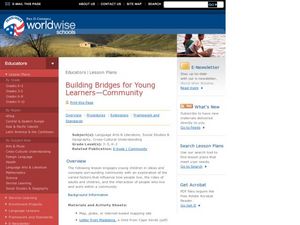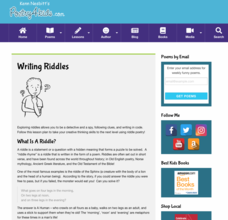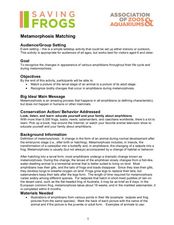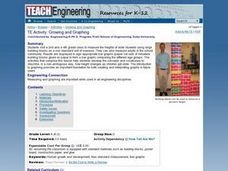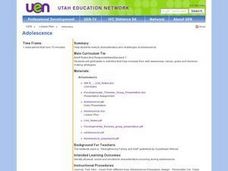Curated OER
The Effects of "Recreational" Drugs on the Development of Chick Embryos as a Model for Human Embryogenesis
Young scholars conduct experiments on fertilized chicken embryos to determine the possible developmental effects that various recreational drugs (caffeine, alcohol, nicotine, and aspirin) might have on them.
Curated OER
Anatomy of the Brain
Students explore human anatomy by completing a quiz. In this brain lesson, students read assigned text which discusses the different elements of the human brain and how they are used in everyday experiences. Students answer a multiple...
Curated OER
Be Kind to Mother Nature!
A clever worksheet on identifying things that harm the environment is here for you. Elementary schoolers read a short paragraph describing the harm that can come to the environment due to human activities. Then, they must circle five...
Curated OER
Building Bridges for Young Learners -- Community
Learners compare and contrast communities.They explore factors that influence how people live, the roles of adults and children, and the interaction of people who live and work within a community. The lesson focuses on the country of...
Novelinks
Nightjohn: List-Group-Label Strategy
Encourage readers of Nightjohn, Gary Paulsen's young adult novel about slavery set shortly before the Civil War, to develop their categorization and organizational skills with a strategy that asks them to list all the words they can...
Poetry4kids
Writing Riddles
What's got 60 eyes, 150 fingers, and an endless number of ideas? Your language arts class! Challenge young writers to come up with clever riddles with an online poetry lesson.
Perkins School for the Blind
Learning to Identify Sounds Made by the Body
Sneeze, snap, tap, and whistle; Did I do that? Explore the parts and sounds of the human body with your learners with visual impairments. First you'll name the parts of the body, make a sound with each part, and then have the class guess...
California Academy of Science
Notice and Wonder
Pint-sized zoologists practice the art of observation. They take notes, pictures or written, as they observe an animal for a period of time. This can be done at the zoo, with a visiting classroom animal, or perhaps at the humane society....
California Academy of Science
Climate Change Impacts
Getting kids thinking about climate change now, will hopefully push them into action when they become adults. Young environmentalists discuss the evidence and causes of climate change seen in the state of California. They brainstorm ways...
Baylor College
Microbes and Disease
Discuss how diseases have impacted human history. Divide your class into groups and assign each group one of the following: tuberculosis, malaria, plague, cholera, smallpox, and AIDS. They read up on, complete a concept map, and present...
Baylor College
The Variety and Roles of Microbes
Mini microbiologists play a card game in which they group microorganisms by groups: virus, fungus, protist, or bacteria. Then they identify the roles different microbes play in the natural world and explore how humans effectively use...
Baylor College
A Place to Be
Home sweet home. Humans, birds, beavers, ants, we all need a place place to rest and keep us safe. In the ninth lesson of this series, the importance of shelter is discussed as the teacher reads aloud the book Tillena Lou's Day in the...
Curated OER
How Can You Be a Revolutionary?
Tenth graders identify priorities in human rights for children. They discuss the role the United Nations has in bringing nations together to work for peace and development. They create a list of imperatives that would address oversights...
Curated OER
Whole Child: Parenting Skills
Students and parents participate in a variety of activities intended to develop both the growth of the child and the parenting skills of the adult. They role-play daily activities, manipulate dough, discuss the rights and...
Curated OER
Rights Abuses Around the World: What Can We Do?
Students read about an Urgent Action information sheet from Amnesty International and a petition about human rights abuses against sexual minorities outside the USA. They discuss the situation, read about other similar cases and then...
Curated OER
Metamorphosis Matching
Students view pictures of animals as they complete the metamorphosis from a larva to an adult. For this metamorphosis lesson plan, students view pictures and in the end are able to match pictures of a larva stage to an adult stage in...
Curated OER
Growing and Graphing
Students visit a 2nd and a 4th grade class to measure the heights of older students using large building blocks as a non-standard unit of measure. They can also measure adults in the school community. Results are displayed in...
Curated OER
Giving an Outdoor Plan
Students utilize their acting skills to put on an impromptu play based on a book. In this performance art lesson, students read Caps for Sale by Esphyr Slobodkina and discuss how the story could be told through human action. Students...
Curated OER
Jury Duty: Honor or Burden
Students come up with a synopsis of whether they feel jury duty is necessary or not and how people rate their experience. They research state jury duty websites and express their ideas. They can propose changes that they feel may...
Curated OER
Social Studies: Adolescent Characteristics
Students examine the various characteristics of adolescence. In a Powerpoint presentation they observe the physical, emotional, and social traits of adolescence. In groups, they investigate researchers associated with developmental...
Baylor College
What Is a Neuron?
Your class won't get on your nerves while doing this modeling activity! After teaching the structure and function of a neuron using the included diagrams, give individuals some clay and chenille stems so that they can make their own...
Baylor College
Neural Network Signals
Using a simple circuit with the battery representing the brain, future physiologists test to see which solutions conduct electrical "nerve impulses." Enlighten learners with plentiful information on electric signals in the nervous system...
Curated OER
Tackling a Statement: Rights of the Child
Learnersare introduced to the idea that people have rights. They voice opinions about whether children should have special rights and be treated differently then adults. The main purpose of the activity is to get students thinking and...
Curated OER
Animal Rights Vs. Animal Welfare - Understanding the Issue
Students explore the difference between animal rights and animal welfare. They take a field trip to a farm to explore the producing animals for human use. After researching and collecting information from animal welfare/rights...





